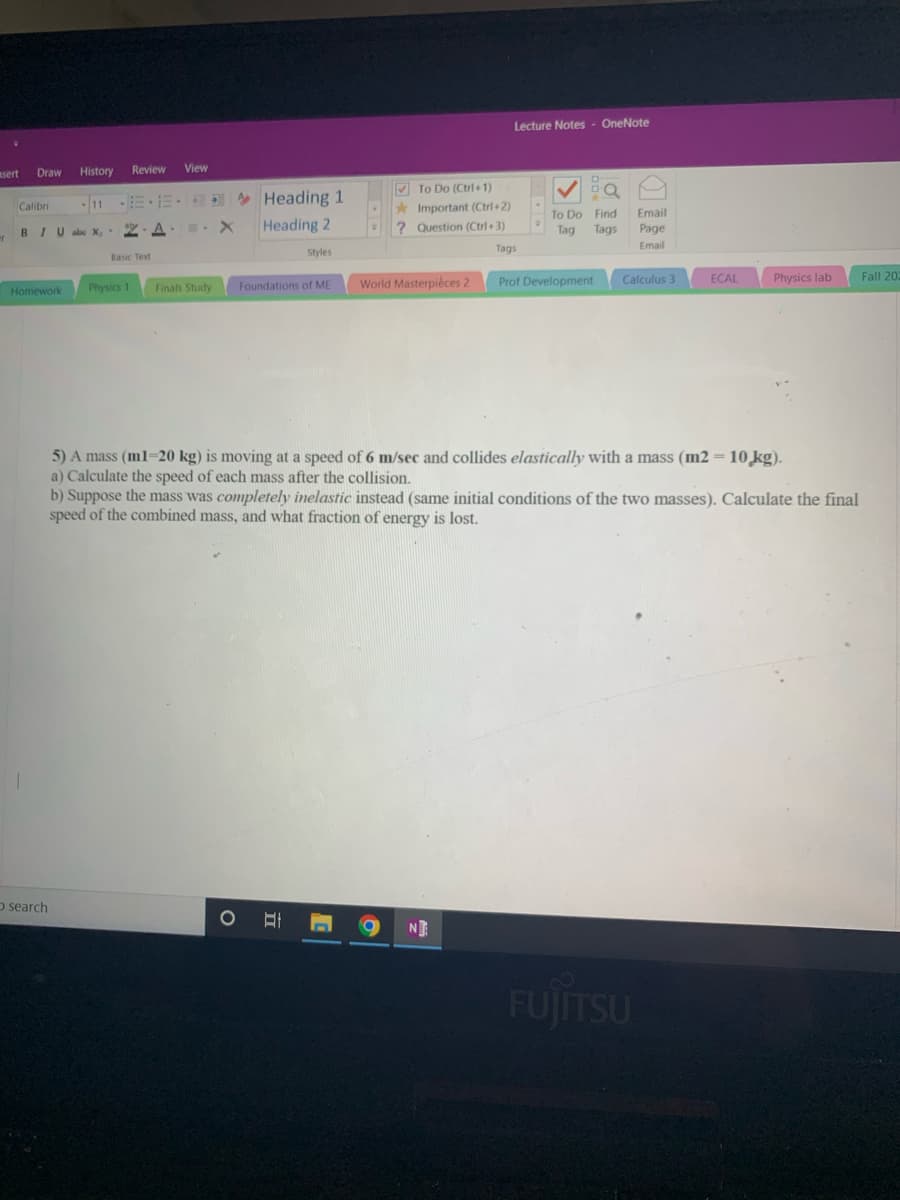5) A mass (ml-20 kg) is moving at a speed of 6 m/sec and collides elastically with a mass (m2 = 10 kg). a) Calculate the speed of each mass after the collision. b) Suppose the mass was completely inelastic instead (same initial conditions of the two masses). Calculate the final speed of the combined mass, and what fraction of energy is lost.
5) A mass (ml-20 kg) is moving at a speed of 6 m/sec and collides elastically with a mass (m2 = 10 kg). a) Calculate the speed of each mass after the collision. b) Suppose the mass was completely inelastic instead (same initial conditions of the two masses). Calculate the final speed of the combined mass, and what fraction of energy is lost.
Astronomy
1st Edition
ISBN:9781938168284
Author:Andrew Fraknoi; David Morrison; Sidney C. Wolff
Publisher:Andrew Fraknoi; David Morrison; Sidney C. Wolff
Chapter18: The Stars: A Celestial Census
Section: Chapter Questions
Problem 13E: Suppose you want to determine the average educational level of people throughout the nation. Since...
Related questions
Topic Video
Question
I could not figure this problem during lecture notes, please help me solve it! ANSWER ALL OR DO NOT ATTEMPT

Transcribed Image Text:Lecture Notes - OneNote
sert
Draw
History
Review
View
V To Do (Ctrl+1)
Heading 1
Heading 2
11
Important (Ctrl+2)
? Question (Ctrl+3)
Calibri
To Do Find
Tag
Tags
Email
BIUale X,
A . X
Page
Tags
Email
Styles
Basic Text
World Masterpiéces 2
Prof Development
Calculus 3
ECAL
Physics lab
Fall 202
Homework
Physics 1
Finals Study
Foundations of ME
5) A mass (ml=20 kg) is moving at a speed of 6 m/sec and collides elastically with a mass (m2 = 10 ̟kg).
a) Calculate the speed of each mass after the collision.
b) Suppose the mass was completely inelastic instead (same initial conditions of the two masses). Calculate the final
speed of the combined mass, and what fraction of energy is lost.
%3D
o search
NE
FUJITSU
Expert Solution
This question has been solved!
Explore an expertly crafted, step-by-step solution for a thorough understanding of key concepts.
Step by step
Solved in 2 steps

Knowledge Booster
Learn more about
Need a deep-dive on the concept behind this application? Look no further. Learn more about this topic, physics and related others by exploring similar questions and additional content below.Recommended textbooks for you

Astronomy
Physics
ISBN:
9781938168284
Author:
Andrew Fraknoi; David Morrison; Sidney C. Wolff
Publisher:
OpenStax


Horizons: Exploring the Universe (MindTap Course …
Physics
ISBN:
9781305960961
Author:
Michael A. Seeds, Dana Backman
Publisher:
Cengage Learning

Astronomy
Physics
ISBN:
9781938168284
Author:
Andrew Fraknoi; David Morrison; Sidney C. Wolff
Publisher:
OpenStax


Horizons: Exploring the Universe (MindTap Course …
Physics
ISBN:
9781305960961
Author:
Michael A. Seeds, Dana Backman
Publisher:
Cengage Learning

Foundations of Astronomy (MindTap Course List)
Physics
ISBN:
9781337399920
Author:
Michael A. Seeds, Dana Backman
Publisher:
Cengage Learning

College Physics
Physics
ISBN:
9781938168000
Author:
Paul Peter Urone, Roger Hinrichs
Publisher:
OpenStax College